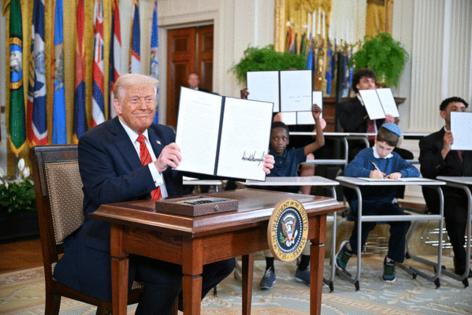Commentary: Why no more Education Department is good news for parents of special-needs children
Published in Op Eds
President Donald Trump’s recent executive order laying out a plan for dismantling the federal Department of Education represents good news for families nationwide. As the mother of a child with special needs and a former member of the National Council on Disability, I can attest that the benefits will extend to children with disabilities as well.
Lest special-needs parents have concerns about the future of Individuals with Disabilities Education Act (IDEA) funding, the order itself does not reduce such funding by one cent. Trump, or any president, cannot reduce IDEA funding even if he wants to — that responsibility lies with Congress. Indeed, the order instructs the secretary of education to ensure “rigorous compliance with federal law,” including IDEA funding and requirements currently existing in statute.
However, to the extent that both the administration and Congress can work to devolve responsibility for education policy to states and local governments, all students will benefit from greater opportunities.
As the order itself notes, the status quo has not served parents well. The most recent nationwide test results show that 70% of eighth-graders are not proficient in reading, and 72% are not proficient in math. Despite Washington spending nearly $200 billion on education during the pandemic, test scores remain lower than in 2019, the year before COVID hit.
The solution lies in removing the layers of regulations, bureaucracy, and wasteful spending — such as a $10 million public relations office — that have characterized the federal Department of Education since its inception. Washington should give power and funds back to states and localities to run education policy as they choose, and those local governments should continue delivering more dollars to the best advocates for a quality education: parents themselves.
My fellow special-needs parents have placed themselves on the vanguard of a new and innovative method of school choice: Education Savings Accounts, or ESAs. First created in Arizona, ESAs empower parents by giving them control over the resources that the state otherwise would have spent on their child’s education. Families can use those funds to pay for tutoring, private school tuition, homeschooling materials or similar educational expenses.
ESAs first began with the special-needs community, which quickly embraced the flexibility the accounts provide. Because families can (and many do) use their ESA dollars to fund multiple types of education expenses, many special-needs parents have found that they can more easily customize their child’s learning program well beyond the limits of any Individualized Education Program in a traditional public school.
A program that first encompassed a small number of special-needs parents in Arizona has since 2011 expanded to 17 different states, with more considering ESA legislation. Nearly half a million students are taking advantage of ESAs this academic year, demonstrating the wide popularity of this new mechanism, and the ability of “parent power” to transform the education landscape quickly.
The way that ESAs have caught on with parents illustrates the potential impact of Trump’s executive order. Moving funds and power out of Washington, and placing them in the hands of those best equipped to decide on the proper educational course for American children—parents themselves—will make the education system more accountable than any number of bureaucrats in the nation’s capital could ever do.
As a special-needs parent and an advocate for families with disabilities, I couldn’t be happier that Trump is delivering on his promise to improve education by empowering parents. All of our nation’s children deserve the best education possible, and this new executive order is a big step toward providing it.
____
Mary Vought, a Heritage Foundation vice president, is a former presidential appointee of the National Council on Disability and a mother of a child with a disability.
_____
©2025 Tribune Content Agency, LLC.




























































Comments